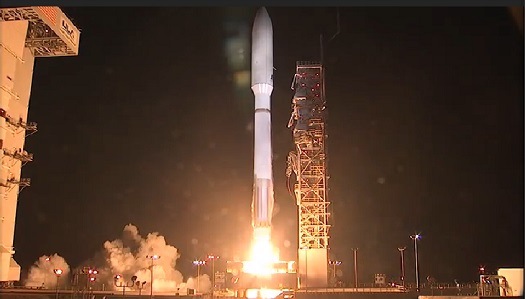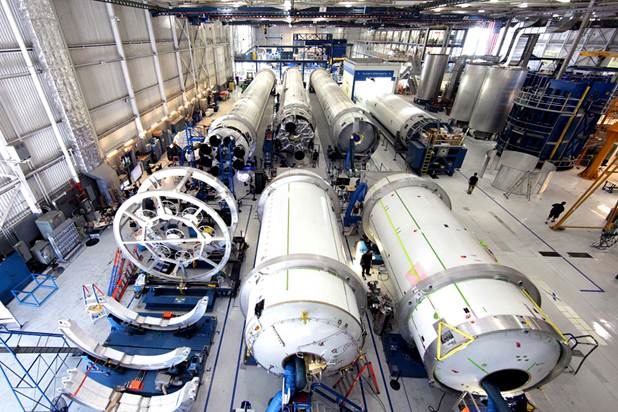ULA, SpaceX Rumble Shaping Up To Rival Tanker Wars
Posted on
WASHINGTON: It is shaping up as one of the great corporate brawls in the aerospace world: snappy and feisty and hungry newcomer, SpaceX, versus the titan of heavy launch, the near-perfect expression of big corporatism, the Boeing-Lockheed Martin United Launch Alliance.
The focus of their competition is obscure to most Americans: the purchase by the Air Force of 36 core boosters for the Evolved Expendable Launch Vehicle (EELV) program to launch large satellite payloads into geosynchronous orbit.
But SpaceX really wants some of that business and is furiously working the halls of justice and Congress, the offices of the Pentagon and intelligence agencies like the National Reconnaissance Office, builder and operator of the nation’s spy satellites.
Here’s the basic story. The Air Force looked at its budget and its launch manifesto for the next few years and decided it could substantially reduce the number of launches it had to buy because satellites were lasting longer and, frankly, there just wasn’t enough money. Each EELV launch costs — on average — north of $200 million, so this is serious money. The number of launches to be competed in the next two years dropped from by half, from 14 to seven or eight.
SpaceX cried foul and SpaceX owner Elon Musk rousted congressmen, senators, lawyers, and lobbyists to help make his case. SpaceX had one great bit of leverage, thanks to the Russian’s illegal annexation of Crimea and repeated incursions into eastern Ukraine. ULA uses RD-180 rocket engines built by Russia to power its Atlas V rockets. They work really well. They are cheap. And ULA has two years worth of RD-180s in hand to weather any unpleasant political or bureaucratic problems.
But Musk, SpaceX’s driving force, is not one to sit back and just jaw jaw (though he does that pretty well.) He went straight to Capitol Hill. Soon we heard senior senators, including Dianne Feinstein, powerful chair of the Senate Intelligence Committee, calling for competition and decrying the use of a Russian-made product. (Dare we point out that Feinstein, who oversees the NRO and NSA and NGA, had said nothing about the perfidious Russians or the need for competition until Musk did not get a share of the EELV launches? Of course, the Russians weren’t so perfidious before then.) Some members of the House soon followed in the footsteps of their Senate colleagues, deploring the fact that America would buy rocket engines from the Russians. Senior Pentagon officials assured lawmakers that they were studying whether and how America should build its own engines to avoid this.
Then SpaceX sought an injunction to stop ULA from buying any more RD-180s and, on Thursday, a U.S. Federal Claims Court judge issued a preliminary injunction against purchases of any more engines. ULA was not pleased and accused SpaceX of trying to “disrupt” a national security launch contract, which could emperil “our nation’s ability to put Americans on board the International Space Station.”
In a statement posted on ULA’s Facebook page (who knew a lumbering corporate titan like ULA could be so nimble?), its general counsel, Kevin MacCary, said his company “is deeply concerned with this ruling and we will work closely with the Department of Justice to resolve the injunction expeditiously. In the meantime, ULA will continue to demonstrate our commitment to our National Security on the launch pad by assuring the safe delivery of the missions we are honored to support.” The subtext here is that ULA has executed a very impressive 68 launches in a row without one of them blowing up or otherwise going haywire. And that, as company executives will tell anyone who will listen, is real rocket science.
Also, MacCary noted that ULA is not alone in doing space business with Russia, its companies, and state-owned businesses. “Just like ULA, NASA and numerous other companies lawfully conduct business with the same Russian company, other Russia state-owned industries, and Russian Federation agencies.” Finally, he included a corporate phooey aimed straight at Musk: “This opportunistic action by SpaceX appears to be an attempt to circumvent the requirements imposed on those who seek to meet the challenging launch needs of the nation and to avoid having to follow the rules, regulations and standards expected of a company entrusted to support our nation’s most sensitive missions.”
The subtext there is that SpaceX and its rockets must be certified by the Air Force and the Intelligence Community to be reliable enough to loft their expensive and strategically important payloads into space. And it hasn’t been yet, though Gen. William Shelton, the head of Air Force Space Command told the House Armed Services Committee last month that certification should happen soon.
On top of the suit filed by SpaceX that resulted in the preliminary injunction, the company also filed a protest against the EELV contract award in the Court of Federal Claims, one of three avenues for companies seeking redress through the filing of formal protests about contracts.
Expect Musk, who has risked much to get as far as he has in the space business, to keep grabbing ULA’s horns, twisting and pulling with all his might for a takedown. But ULA, composed of parts of Boeing and Lockheed Martin, offers the Pentagon a proven product in a highly complex venture. Musk is great at pressing his case in public and he’s willing to take risks that ULA might forego. But ULA has made its case to the Air Force in a very persuasive manner: it has launched those payloads 68 times and they all got to where they were supposed to go. Also, Gen. Shelton keeps telling Congress the new contract, announced in December, saves taxpayers more than $4 billion. That is not chump change in an era of declining budgets. Also, canceling the existing purchase would cost taxpayers some $370 million.
You can hear the growl in the voices of ULA leaders as they grapple with this launch upstart. Musk doesn’t play the usual quiet Washington game. He shouts from the top of the National Press Club, works the Hill himself, goes to court against what could be his biggest customer (the Air Force), and grabs every lever he can find, and all the while he builds Tesla electric cars, solar panels and more rockets. This will be a compelling battle, one with very real strategic consequences for the United States.
On top of the Washington side of all this, there’s the thrill of watching each SpaceX launch to see if they maintain their reliability, which had been suspect but now seems under control. The next International Space Station launch is scheduled for August.
Will all this rival the drama of the airborne tanker wars when what was EADS (now Airbus) and Northrop Grumman were arrayed against the mighty (and ultimately victorious) Boeing? Rockets are a lot more exciting than airborne tankers. Elon Musk is a lot more compelling and ready to embrace risk than were the lobbyists and spokesmen who did most of the talking during the tanker wars. Even so, the tanker wars did last for years. Hmm.
Subscribe to our newsletter
Promotions, new products and sales. Directly to your inbox.


